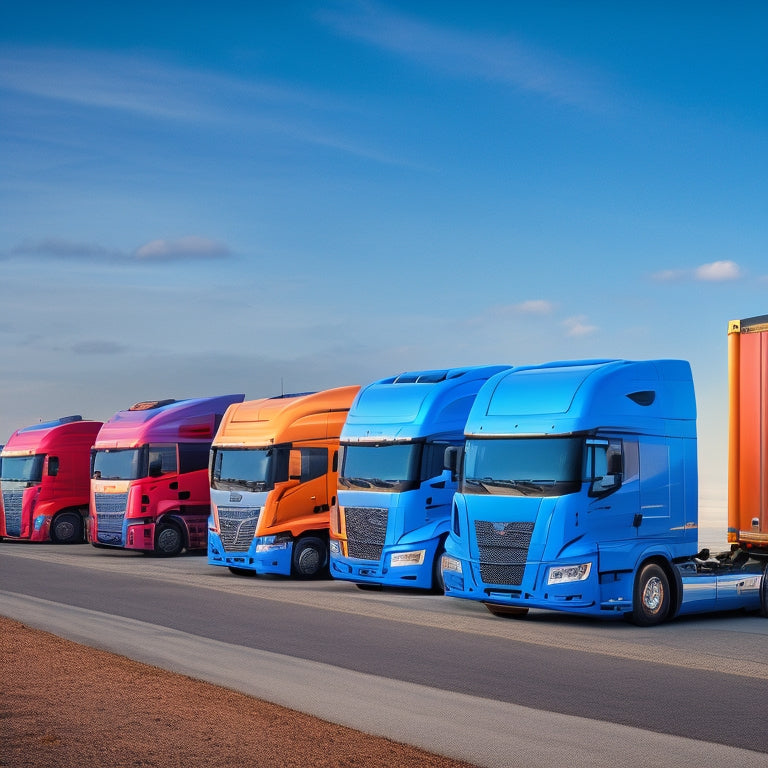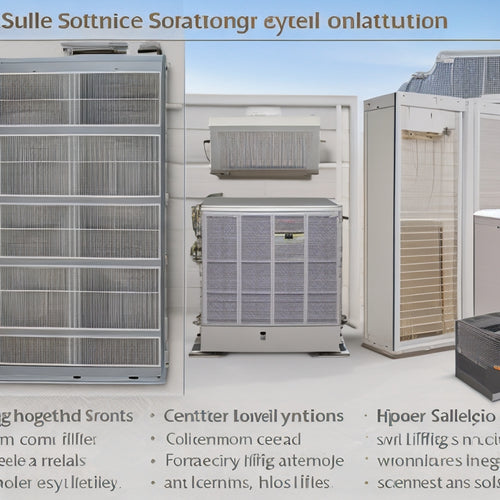
Nikola Boosts Fleet With Additional Hydrogen FCEVS
Share
Nikola has expanded its fleet with an additional 100 hydrogen fuel cell electric vehicles (FCEVs), building on its initial order of 50 vehicles. This move reinforces the company's commitment to sustainable logistics solutions, particularly in the drayage division. The added FCEVs will enhance the company's environmentally friendly transportation offerings. With a range of 500 miles and zero emissions, Nikola's hydrogen FCEVs are poised to make a significant impact. As the company continues to invest in hydrogen infrastructure and FCEV adoption, the future of sustainable logistics looks promising - and there's more to explore in the world of hydrogen-powered transportation.
Key Takeaways
• AiLO expands its fleet capacity with an additional 100 hydrogen FCEVs from Nikola, demonstrating its commitment to sustainable logistics.
• Nikola's FCEVs have a range of 500 miles with zero emissions, a 20-minute refueling time, and a top speed of 70 mph.
• The new FCEVs will enhance AiLO's sustainable logistics solutions, particularly in the drayage division, and position the company as an environmental leader.
• Nikola is establishing a network of high-pressure modular refueling stations, including the inaugural HYLA station in California, to support widespread FCEV adoption.
• The increased adoption of FCEVs is expected to reduce emissions and operating costs, driving the adoption of sustainable practices in logistics and transportation.
Expanding Fleet Capacity
AiLO's recent order of 100 additional hydrogen FCEVs from Nikola marks a significant expansion of its fleet capacity, building upon its initial order of 50 vehicles placed in 2023. This move demonstrates AiLO's commitment to meeting the growing demands of the port industry.
The expanded fleet will enhance the company's sustainable logistics solutions, particularly in its drayage division. With this increased capacity, AiLO is poised to further establish itself as a leader in environmentally friendly transportation.
The addition of these FCEVs will not only reduce emissions but also provide a reliable and efficient service to clients. As AiLO continues to invest in its fleet, it reinforces its dedication to a more sustainable future for the logistics industry.
FCEV Key Specifications
Nikola's hydrogen FCEVs boast impressive specifications, including a range of 500 miles with zero emissions, a hydrogen storage capacity of 70 kilograms, and a refueling time of 20 minutes or less.
These key specifications highlight the vehicles' capabilities regarding range optimization. The FCEVs feature a 200-kilowatt fuel cell power module, 164-kilowatt total battery capacity, 536 horsepower, and a top speed of 70 mph.
The fuel cell efficiency is optimized to provide a seamless driving experience. Moreover, the vehicles' range optimization is achieved through advanced technologies, ensuring a smooth and efficient ride.
With these specifications, Nikola's hydrogen FCEVs are poised to revolutionize the logistics industry with sustainable and efficient transportation solutions.
Refueling Infrastructure Support
Through strategic infrastructure development, Nikola is establishing an extensive network of high-pressure modular refueling stations. This effort is exemplified by its inaugural HYLA station in California, which can refuel up to 40 FCEVs daily.
This infrastructure development supports the company's goal of promoting hydrogen adoption and reducing environmental impact. The refueling infrastructure is designed to facilitate operational efficiency, ensuring that FCEVs can be quickly and easily refueled, minimizing downtime and maximizing productivity.
- Enhancing the overall FCEV ownership experience through convenient and reliable refueling options
- Providing a scalable and modular refueling solution to meet growing demand
- Supporting the widespread adoption of hydrogen FCEVs, leading to a reduced environmental impact
- Ensuring operational efficiency and minimizing downtime for fleet operators
Industry Trends and Insights
As the adoption of hydrogen fuel cell electric vehicles (FCEVs) continues to gain momentum, industry stakeholders are closely monitoring emerging trends and insights that will shape the future of sustainable logistics and transportation. The growth of FCEVs is driven by the need for sustainable practices and reduced carbon emissions.
| Trend | Insight |
|---|---|
| Increased adoption of FCEVs | Reduced emissions and operating costs |
| Investment in hydrogen infrastructure | Widespread adoption of FCEVs |
| Development of new FCEV models | Increased range and performance |
| Integration with existing logistics systems | Seamless shift to sustainable practices |
Industry innovations, such as Nikola's hydrogen FCEVs, are driving the adoption of sustainable practices in logistics and transportation. As the industry continues to evolve, stakeholders will be closely monitoring emerging trends and insights to stay ahead of the curve.
Enhancing Sustainable Logistics
Optimizing logistics operations with hydrogen FCEVs is essential for reducing carbon footprint and enhancing sustainable practices in the industry. By incorporating Nikola's hydrogen FCEVs into their fleet, companies can greatly reduce emissions and improve their overall sustainability. This is particularly important for industries such as drayage, where emissions reduction is vital.
Effective fleet management is critical in achieving these goals.
Some key benefits of hydrogen FCEVs in logistics include:
- Reduced emissions: zero-emission operations minimize carbon footprint
- Increased efficiency: optimized routes and schedules reduce fuel consumption
- Improved fleet management: real-time monitoring and data analysis enable data-driven decisions
- Enhanced sustainability: reduced emissions contribute to a cleaner environment
Frequently Asked Questions
What Is the Total Number of Nikola FCEVS Ordered by Ailo Now?
As AiLO's fleet expansion unfolds like a puzzle piece falling into place, the total number of Nikola FCEVs ordered now stands at 150, bolstering logistics planning and sustainable operations.
How Long Does It Take to Fully Refuel a Nikola Fcev?
Refueling Timeframes for Nikola FCEVs are remarkably efficient, with a fueling experience that takes 20 minutes or less, allowing for quick turnaround times and minimizing downtime for AiLO's logistics operations.
What Is the Average Daily Capacity of Nikola's HYLA Refueling Station?
Importantly, Nikola's HYLA refueling station can refuel 40 FCEVs daily, boasting an impressive capacity. Regarding refueling strategies, HYLA's high-pressure modular design maximizes hydrogen capacity, efficiently refueling vehicles in under 20 minutes, ideal for high-demand fleets.
What Is the Purpose of Nikola's Refueling Infrastructure Development?
Nikola's refueling infrastructure development aims to create Hydrogen Highways and Clean Corridors, facilitating the widespread adoption of hydrogen fuel cell electric vehicles by providing convenient, efficient, and reliable refueling solutions.
What Is Ailo's Goal in Expanding Its Drayage Division?
AiLO aims to enhance its sustainable logistics solutions by expanding its drayage division, focusing on logistics growth and efficient operations, thereby meeting the port industry's growing demands through environmentally friendly and streamlined transportation services.
Related Posts
-

Why Solar HVAC Filters Revolutionize Home Energy Efficiency
By adopting solar HVAC filters, you're shifting your home's energy reliance from fossil fuels to clean, renewable sou...
-

3 Sun-Powered Automated Shades for Energy-Savvy Homes
You're looking to change your home into an energy-savvy haven, and sun-powered automated shades are an essential step...
-

10 Best Energy-Efficient External Hard Drives for Sustainable Offices
When it comes to sustainable offices, you need external hard drives that balance data storage needs with energy effic...


